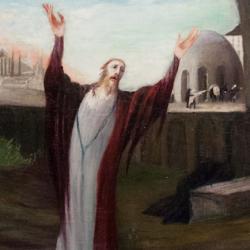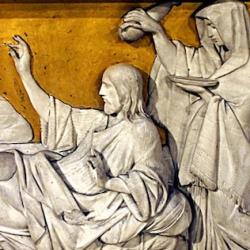INTRODUCTION
Jesus’ lawsuit against the scribes and Pharisees focuses on their failures of leadership (vv. 13-15), their neglect of the important things in the law (vv. 16-24), and their concentration on external show rather than internal purity (vv. 25-28). Of course, these diseases of the soul are not confined to Pharisees. They are plenty common among Christians.
THE TEXT
“But woe to you, scribes and Pharisees, hypocrites! For you shut up the kingdom of heaven against men; for you neither go in yourselves, nor do you allow those who are entering to go in . . . .” (Matthew 23:13-28).
BLIND GUIDES
As teachers of the Mosaic law, they should be preparing the people for the coming of God’s kingdom. Instead, they teach the law in a way that creates barriers to entry (v. 13). They focus on human traditions in a way that diverts attention from the word of God. The Jews after the exile were energetic in missions, but Jesus charges that the Pharisees’ converts are even worse than they are (v. 15). In Mark and Luke, the curse of verse 14 appears in connection with the story of the widow and her mite (Mark 12:38-44; Luke 20:45-21:4). Though the widow gives her small gift out of sincerity, Jesus sees that she is driven to give her last bit of money because of pressure from greedy Jewish teachers. Instead of taking from widows, the leaders are supposed to be supporting widows.
WEIGHTY THINGS OF THE LAW
As in the Sermon on the Mount and elsewhere, Jesus curses the scribes and Pharisees for finding clever ways to escape the force of the law. Oaths are to be straightforward, clear promises, backed up by an appeal to God as witness. Instead, the Pharisees and scribes employ formulae that leave them loopholes in their oath-taking (vv. 16-21). “Let your Yes be Yes, and your No be No,” Jesus has said. Pharisees were scrupulous about tithing (Leviticus 28:30-33; Numbers 18:21 -32; Deuteronomy 14:22 -29), partly out of a desire for purity. Before they use their mint, they give the Lord His portion, lest they commit the sacrilege of consuming the Lord’s mint. Jesus doesn’t annul tithing, and He even commends the Pharisees’ scrupulosity about the details of tithing. But while they busy themselves with careful calculation of the tithe, they ignore the whole point of tithing and of the whole law, which is to promote justice, mercy, and truth. Their obedience becomes a form of disobedience. They won’t drink from a cup of wine with an unclean gnat floating on the surface, but they don’t even notice the equally unclean camel below the surface (v. 24).
INSIGHT AND OUTSIDE
Jesus wants His disciples to be clean inside and out (v. 26). The Pharisees’ error is not their concern with outward purity, purity of action. Their error is that their purity is partial, and neglects the starting point for purity. They are like vessels that are shiny on the outside, but full of germs on the inside (v. 25). Jesus’ comparison of the Pharisees to whitewashed tombs makes the same point, but with an ironic twist. The Pharisees are obsessed with purity, but because they are full of death within they actually spread impurity (v. 27). As Jesus has said before, their central sin is to act to be seen of men, rather than to be seen as righteous by God (v. 28, cf. v 5), the God who looks on the heart (1 Samuel 16:7).















